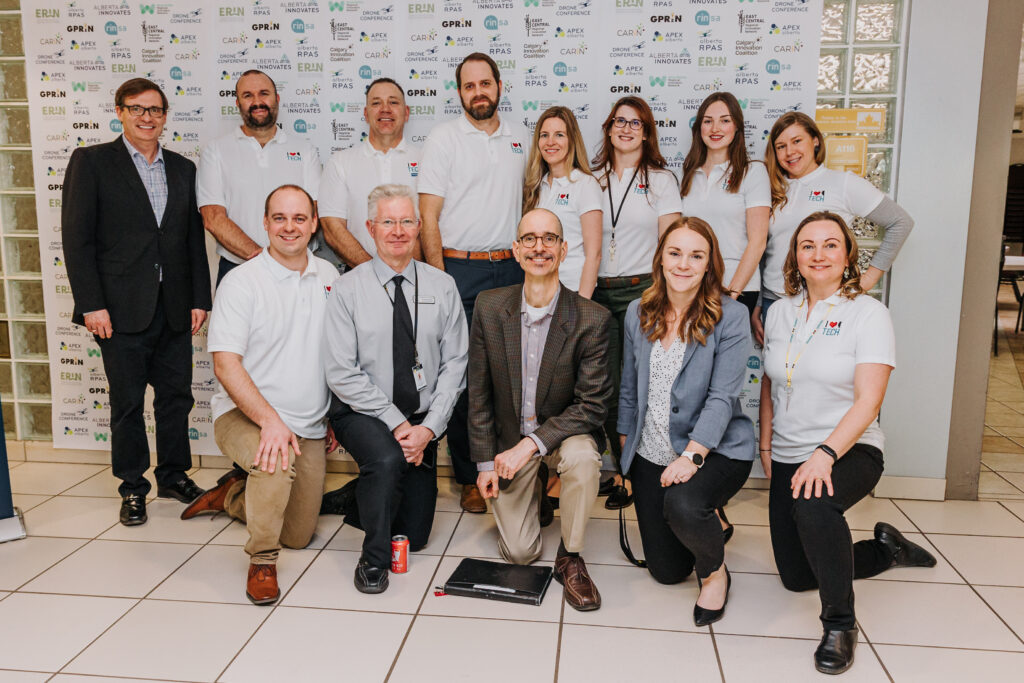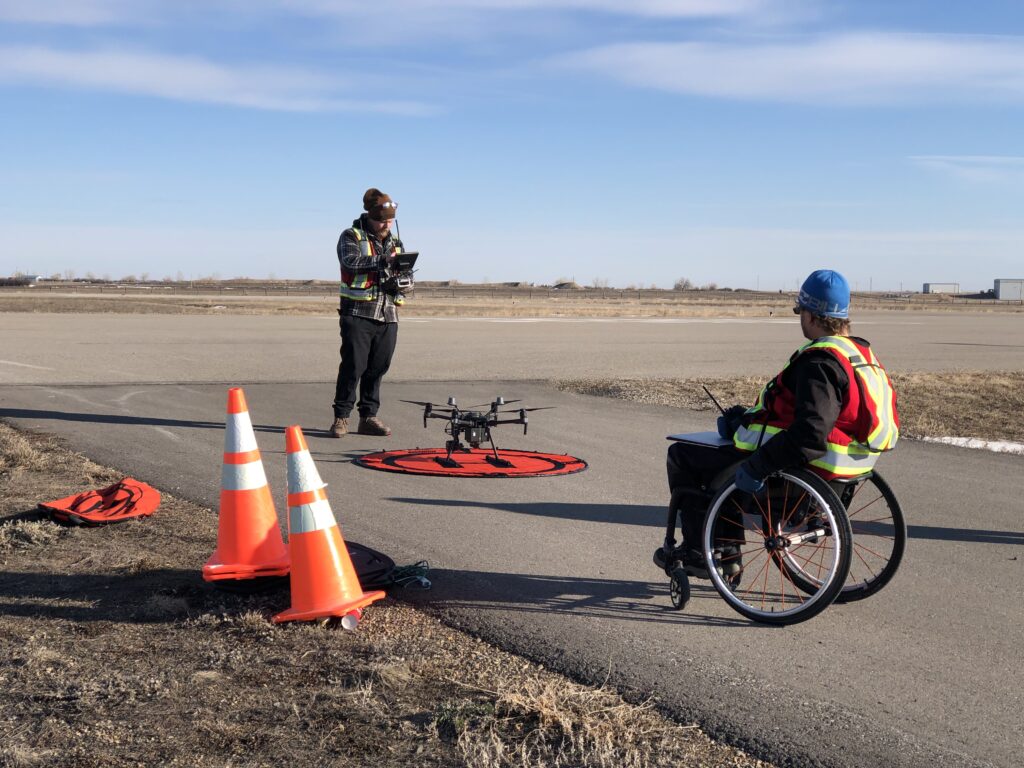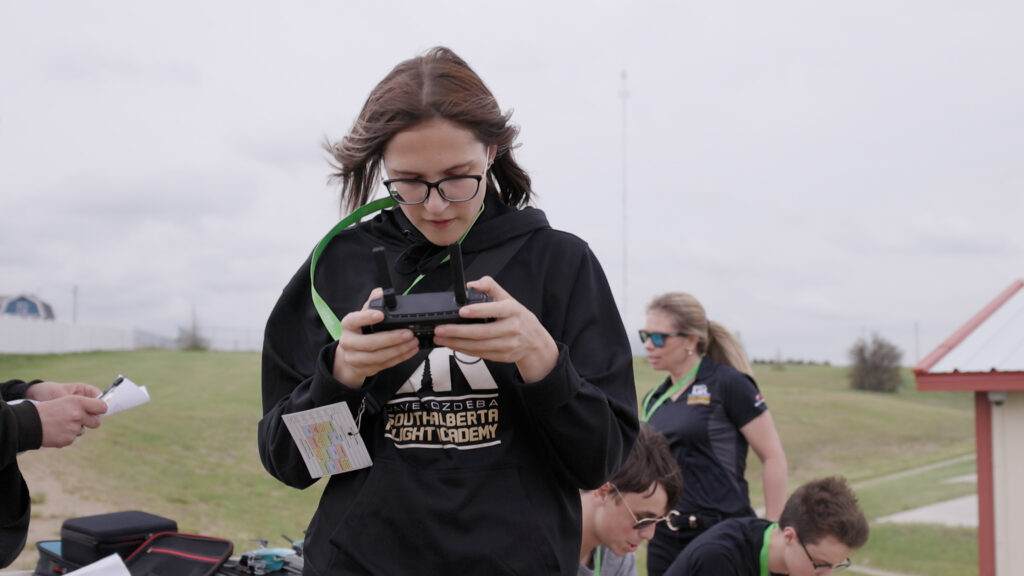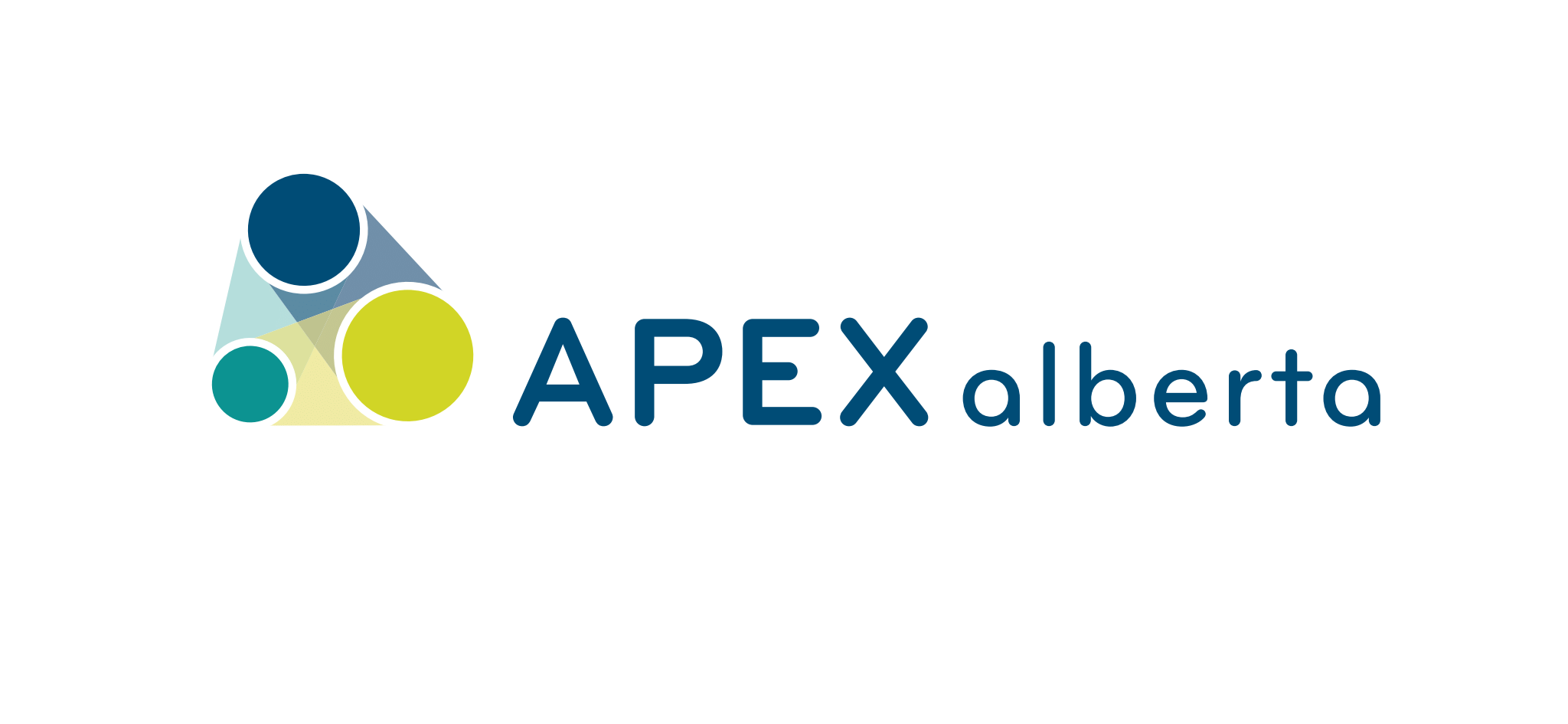APEX Alberta is Southeast Alberta’s Regional Innovation Network. Nestled in the southern corner of the province, Southeast Alberta is a rural region known for agriculture, energy, defence, and manufacturing. Southeast Alberta’s Regional Innovation Network spans from Special Areas in the north to the County of Newell and Municipal District of Taber to the west, to Cypress County, the County of Forty Mile and south, down to the United States border.

Back row: from left to right. Michael Kerr, Sean Blewett, Jeremy Patton, Darren Hall, Erin Ferris, Shannan Hurlbut, Jalyce Thompson, & Lisa Galecki Front row: from left to right. Jordan Pomrenke, Mark Keller, Roger Haessel, Chelsey Ehresman, & Tracy Stroud
Organizationally, APEX consists of many collaborators and supporters. They are a network of service providers–independent, municipal, provincial, and federal organizations that drive positive change and critical mass in innovation and technology in the southeast region of Alberta. As a collaboration, APEX is governed by representatives from Alberta Innovates, Community Futures Entre-Corp Business
Development, Medicine Hat College, Brooks-Newell Region, and Defence Research and Development Canada – Suffield Base.
Focusing on entrepreneurs and inventors, specifically those with novel or technology-enabled solutions, APEX works closely with regional
and provincial partners to help SMEs develop and commercialize new technology and knowledge-based products and services and navigate the innovation and startup ecosystem. They also support research and ecosystem-building through special projects, networking events and training programs.
In early 2022, the Southeastern Regional Innovation Network was successful in receiving funding from Alberta Innovates to investigate
a Remotely Piloted Aircraft Systems (RPAS) growth strategy for the province. The market for RPAS, often called drones, is forecast to grow exponentially over the coming years. Alberta is home to a disproportionately high number of RPAS assets. Transport Canada estimated the global commercial drone market to be worth over $6B in 2020 (Transport Canada, 2021), with other sources speculating that the global commercial drone market will grow from $8.15 billion in 2022 to $47.38 billion by 2029 (Fortune Business Insights, 2022).
Just a Quick Note:
InnovationsOfTheWorld.com has partnered with Trade License Zone (TLZ) to support global innovators looking to expand internationally. Take advantage of the UAE’s Free Zones—enjoy streamlined setup, low corporate taxes, and a strategic gateway to the Middle East and beyond.
Get Your UAE Free Zone License Fast & Easy!
In early 2022, the Southeastern Regional Innovation Network was successful in receiving funding from Alberta Innovates to investigate a Remotely Piloted Aircraft Systems (RPAS) growth strategy for the province. The market for RPAS, often called drones, is forecast to grow exponentially over the coming years. Alberta is home to a disproportionately high number of RPAS assets. Transport Canada estimated the global commercial drone market to be worth over $6B in 2020 (Transport Canada, 2021), with other sources speculating that the global commercial drone market will grow from $8.15 billion in 2022 to $47.38 billion by 2029 (Fortune Business Insights, 2022).
Southeast Alberta is home to one of only two RPAS test ranges in Canada with class F restricted airspaces specifically designed by Transport Canada for beyond-visual line-of-sight (BVLOS) testing, research and development—the Foremost UAS Test Range. Alberta is already a Canadian leader in RPAS. Having the Unmanned Arial Systems (UAS) Test Range, the BVLOS Innovation Centre (BVLOS InC), Defence Research and Development Canada (DRDC) – Suffield Base and a significant number of RPAS companies alongside industries that would benefit from incorporating RPAS technologies into their operations. Industries such as mining, forestry, energy, agriculture, safety and logistics to name a few, all have significant use cases for RPAS technologies. Another example of RPAS innovation is at Edmonton International Airport (YEG). YEG is a national leader in integrating and using Remotely Piloted Aircraft
Systems at airports. Drones are used for various special programs, such as scaring away birds and wildlife with a falcon-shaped Robird drone. YEG also employs this technology for LIDAR scans of their runways to detect safety and maintenance issues before they arise. YEG was also the first Canadian airport to operate drones at night, enhancing aircraft landing safety. They are currently trialing commercial drone cargo delivery services to become the hub for this service for western Canada in the coming years (Edmonton International Airport, 2022). These factors make Alberta uniquely positioned to lead the way in the Canadian drone sector domestically and beyond.

Post-Secondary institutions (PSIs) across Alberta are conducting RPAS research and testing first-of-their-kind operations. Over 60% of Alberta PSIs have RPAS-related courses, and many are also involved with or leading applied research projects with RPAS. The Southern
Alberta Institute of Technology (SAIT) has Canada’s only RPAS mounted ground-penetrating radar. The University of Lethbridge (UofL) offers the only degree in remote sensor technology in Canada. Additionally, they have the only remote sensor calibration laboratory in the country. The UofL also has a department using RPAS for rare plant species identification. The University of Alberta (UofA) uses RPAS
in conjunction with an autonomous sailboat to monitor water health and algae blooms in the St. Mary irrigation district. Lakeland College
uses RPAS to monitor respiratory behaviours in cattle, and Olds College uses RPAS in conjunction with facial recognition software for cattle herd monitoring.
From the applied research taking place across the province to the growing number of industry applications arising and the prolific growth of RPAS companies throughout Alberta, RPAS technology is at an incredibly exciting moment. Together RPAS stakeholders and researchers are shaping a multi-billion-dollar sector with high growth potential for Alberta and Canada. APEX Alberta is proud to be championing the awareness of this opportunity.
Transport Canada. (2021). Transport Canada’s Drone Strategy to 2025. Government of Canada. https://tc.canada.ca/sites/default/files/2021-03/
TC223-Drone-Strategy-ENG-ACC.pdf
Fortune Business Insights. (2022, May). Commercial drone market size, share & covid-19 impact analysis by weight. (Commercial Drone Market Size, Share | Forecast Report [2029]. Retrieved December 5, 2022, from https://www.fortunebusinessinsights.com/commercial-drone-market-102171
Edmonton International Airport. (2022). Drone Operations: YEG a national leader in drone technology. Retrieved December 8, 2022, from
ttps://flyeia.com/business/aatc/drone-operations/















